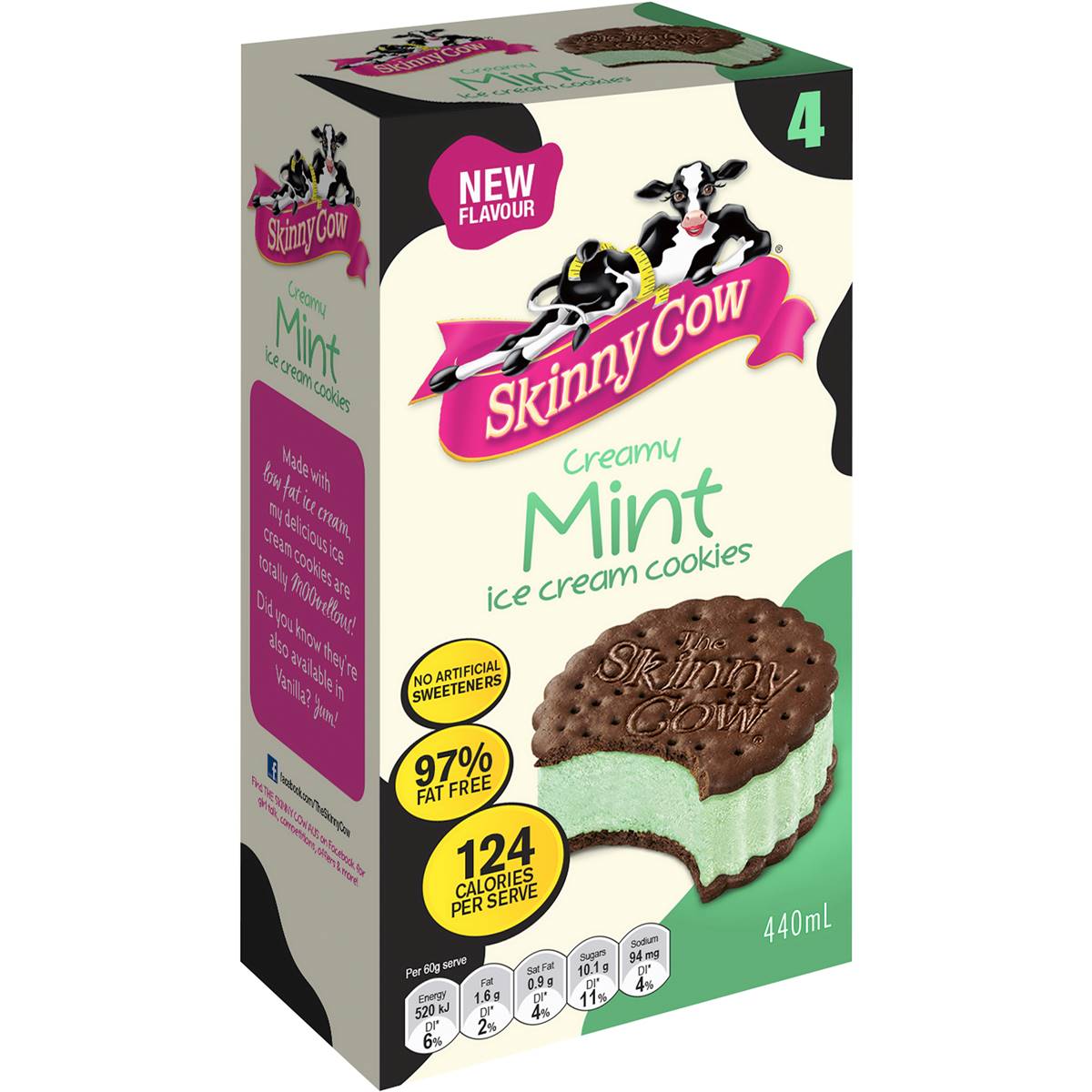Skinny Cow Products and Target Audience

Skinny Cow, a brand owned by the renowned dairy company, Dean Foods, has carved a niche in the frozen dessert market by catering to health-conscious consumers seeking indulgence without compromising their dietary goals.
Product Line and Target Audience
Skinny Cow’s product line consists primarily of frozen desserts, including ice cream, frozen yogurt, and ice cream bars. The brand’s core focus is on providing low-calorie, low-fat, and often sugar-free options, appealing to a wide range of consumers, including:
- Weight-conscious individuals: Skinny Cow’s low-calorie and low-fat offerings provide a guilt-free indulgence for those watching their weight.
- Health-conscious consumers: The brand’s focus on healthier ingredients, such as sugar substitutes and reduced fat content, attracts health-conscious individuals who prioritize nutritional value.
- Diabetics: Skinny Cow offers sugar-free options, making it a viable choice for those managing diabetes.
- Individuals with dietary restrictions: The brand caters to specific dietary needs, such as gluten-free and dairy-free options.
Marketing Strategies
Skinny Cow employs various marketing strategies to reach its target audience:
- Targeted Advertising: The brand utilizes digital advertising platforms, such as social media and search engines, to reach consumers actively searching for low-calorie or health-conscious dessert options.
- Product Placement: Skinny Cow products are strategically placed in supermarkets and convenience stores, ensuring visibility in key shopping locations.
- Partnerships and Collaborations: The brand collaborates with fitness influencers and health bloggers to promote its products to a wider audience.
- Promotional Offers and Discounts: Skinny Cow offers regular promotions and discounts, incentivizing consumers to try its products and build brand loyalty.
Brand Positioning
Skinny Cow’s positioning in the market is characterized by its unique selling propositions:
- Healthier Indulgence: The brand positions itself as a healthier alternative to traditional ice cream, offering lower calories, fat, and sugar without sacrificing taste.
- Variety and Innovation: Skinny Cow offers a diverse range of flavors and product formats, catering to different preferences and dietary needs.
- Affordability: The brand’s pricing strategy makes its products accessible to a wider consumer base.
Skinny Cow’s success lies in its ability to provide a guilt-free indulgence that caters to the growing demand for healthier dessert options.
Nutritional Aspects and Consumer Health: Skinny Cow

Skinny Cow ice cream bars are marketed as a healthier alternative to traditional ice cream options. They are lower in calories, fat, and sugar, making them appealing to consumers looking for guilt-free indulgence. However, it’s important to examine the nutritional profile of Skinny Cow products in detail and assess their impact on consumer health and dietary choices.
Comparison with Traditional Ice Cream
Skinny Cow ice cream bars typically have fewer calories, fat, and sugar compared to traditional ice cream options. For instance, a standard serving of full-fat ice cream can contain around 250 calories, 15 grams of fat, and 25 grams of sugar. In contrast, a Skinny Cow ice cream bar might contain around 150 calories, 5 grams of fat, and 15 grams of sugar. This significant difference in nutritional content makes Skinny Cow a more appealing choice for consumers seeking to manage their calorie intake and reduce their sugar consumption.
Impact on Consumer Health and Dietary Choices
The lower calorie and sugar content of Skinny Cow ice cream bars can potentially benefit consumer health. They can help individuals control their weight and reduce their risk of developing chronic diseases associated with high sugar intake, such as type 2 diabetes and heart disease. However, it’s crucial to consider the overall dietary context and consumption frequency.
Potential Benefits and Drawbacks
Benefits
- Weight Management: Skinny Cow ice cream bars can contribute to weight management by providing a lower-calorie alternative to traditional ice cream. Consuming them in moderation as part of a balanced diet can help individuals control their calorie intake and maintain a healthy weight.
- Reduced Sugar Intake: The lower sugar content in Skinny Cow ice cream bars can be beneficial for individuals seeking to reduce their sugar consumption. Lower sugar intake can help regulate blood sugar levels and reduce the risk of developing chronic diseases associated with high sugar intake.
- Variety and Enjoyment: Skinny Cow offers a variety of flavors and options, allowing consumers to enjoy a sweet treat without feeling guilty or compromising their health goals. This variety can contribute to a more enjoyable and sustainable approach to weight management and healthy eating.
Drawbacks
- Processed Ingredients: Skinny Cow ice cream bars often contain artificial sweeteners, flavors, and colors. While these ingredients may contribute to the lower calorie and sugar content, they can raise concerns about their long-term health effects. Some individuals may be sensitive to these ingredients, experiencing digestive issues or other adverse reactions.
- Potential for Overconsumption: Despite being lower in calories and sugar, Skinny Cow ice cream bars can still contribute to overall calorie intake. Consuming them frequently or in large quantities can undermine weight management efforts and potentially lead to unhealthy dietary habits.
- Limited Nutritional Value: Skinny Cow ice cream bars are primarily a source of calories, sugar, and fat. They lack significant amounts of essential nutrients, such as protein, fiber, and vitamins. Therefore, they should not be considered a substitute for nutritious foods like fruits, vegetables, and whole grains.
Market Trends and Competitive Landscape

The frozen dessert market is a dynamic and competitive landscape, driven by consumer preferences for convenient, indulgent, and healthy options. Skinny Cow operates within this competitive landscape, facing numerous rivals vying for market share.
Key Competitors in the Frozen Dessert Market
Understanding the strategies of Skinny Cow’s competitors is crucial to assess its competitive position. Some of the key players in the frozen dessert market include:
- Haagen-Dazs: Known for its premium ice cream, Haagen-Dazs caters to consumers seeking high-quality and indulgent experiences. The brand leverages its reputation for luxury and flavor innovation to attract customers.
- Ben & Jerry’s: This brand focuses on social responsibility and unique flavors, appealing to consumers who value ethical sourcing and adventurous taste profiles. Ben & Jerry’s also employs a strong brand identity and marketing strategies to resonate with its target audience.
- Breyers: Breyers positions itself as a family-friendly brand offering a wide range of flavors and formats. The brand emphasizes affordability and convenience, targeting a broad consumer base.
- Edy’s: Similar to Breyers, Edy’s targets a broad audience with a focus on affordability and variety. The brand offers a range of ice cream flavors and formats, including frozen yogurt and ice cream bars.
- Yoplait: Yoplait is a major player in the frozen yogurt market, known for its focus on healthy and low-fat options. The brand appeals to consumers seeking healthier alternatives to traditional ice cream.
Competitive Strategies Employed by Skinny Cow’s Competitors
Skinny Cow’s competitors utilize various strategies to attract consumers. These strategies include:
- Product Innovation: Competitors continuously introduce new flavors, formats, and ingredients to cater to evolving consumer preferences. For example, Haagen-Dazs has launched limited-edition flavors and collaborations with renowned chefs, while Ben & Jerry’s has introduced plant-based ice cream options to cater to vegan consumers.
- Marketing and Branding: Competitors invest heavily in marketing and branding to build brand awareness and loyalty. Haagen-Dazs uses luxury imagery and sophisticated packaging to communicate its premium positioning, while Ben & Jerry’s leverages its social responsibility message and quirky brand personality to connect with its target audience.
- Distribution and Availability: Competitors focus on expanding their distribution channels and making their products readily available to consumers. Haagen-Dazs can be found in upscale grocery stores and restaurants, while Ben & Jerry’s is widely available in convenience stores and supermarkets.
- Pricing and Promotions: Competitors utilize pricing strategies and promotions to attract value-conscious consumers. Breyers offers value packs and seasonal promotions, while Edy’s focuses on affordable pricing and consistent product availability.
Strengths and Weaknesses of Skinny Cow in Relation to its Competition
Skinny Cow possesses unique strengths and weaknesses compared to its competitors.
- Strengths:
- Focus on Portion Control: Skinny Cow’s emphasis on smaller portions caters to consumers seeking portion control and healthier choices. This differentiates the brand from competitors that typically offer larger servings.
- Low-Calorie and Low-Fat Options: Skinny Cow’s products are marketed as low-calorie and low-fat alternatives to traditional ice cream. This resonates with health-conscious consumers who seek indulgence without excessive calories or fat.
- Variety of Flavors and Formats: Skinny Cow offers a range of flavors and formats, including ice cream bars, cones, and cups. This variety allows the brand to appeal to diverse consumer preferences.
- Strong Brand Identity: Skinny Cow has established a clear and recognizable brand identity, associating its products with indulgence and portion control. This allows the brand to differentiate itself from competitors.
- Weaknesses:
- Limited Distribution: Skinny Cow’s distribution is relatively limited compared to larger competitors like Breyers and Edy’s. This can restrict access to potential customers.
- Perception of Artificial Ingredients: Some consumers perceive Skinny Cow’s products as containing artificial ingredients, which may deter those seeking natural and organic options. This perception can be a barrier to attracting certain segments of the market.
- Price Sensitivity: Skinny Cow’s products are typically priced higher than traditional ice cream brands, which can be a barrier for price-sensitive consumers. This can limit the brand’s appeal to budget-conscious shoppers.
While the term “skinny cow” might conjure images of a bovine fashion icon, it’s also a popular brand of low-fat milk. Of course, if you’re talking about someone who’s “skinny” and “cow” in the same sentence, you might be thinking of Kevin James, who famously played a zookeeper in the movie “Zookeeper.” But even if he’s not literally a cow, he’s certainly made a hefty fortune in his career.
You can check out his impressive net worth here , but we’re pretty sure he’s not using it to buy any skinny cow milk – unless he’s got a really big family.
The concept of a “skinny cow” might seem like an oxymoron, but in the world of comedy, anything is possible. Just like the unexpected humor in Adam Sandler’s new special, which has been generating buzz online , the idea of a skinny cow can be a source of amusement.
After all, who says a cow can’t be as svelte as a gazelle? Maybe it’s just a matter of perspective, or perhaps a very, very strict diet of grass and kale.
